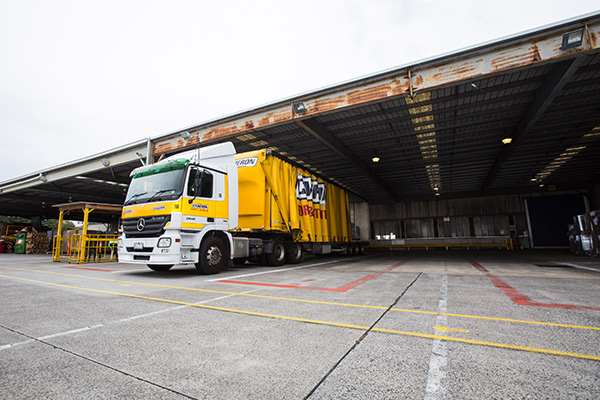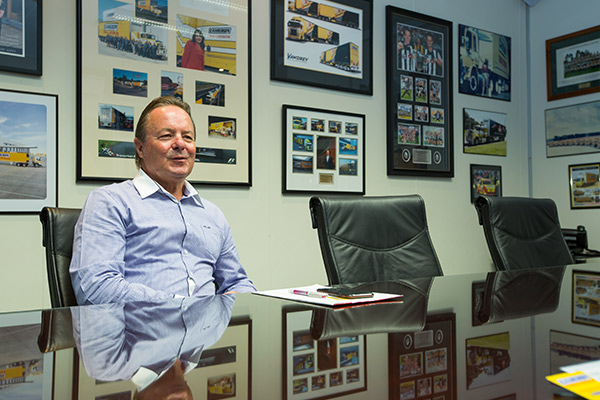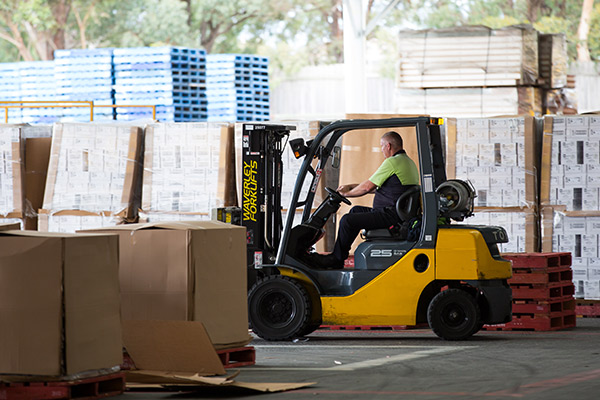In its 40th anniversary year, Glen Cameron’s transport empire is in the prime of its life. The down-to-earth managing director shares there are even greater years to come
It wasn’t the best of beginnings to a transport industry career.
Glen Cameron says he was always going to be involved in the trucking sector, but his early plan involved a much longer stint with his father’s company D&E Cameron Transport.
The medium-sized interstate line-haul operation was well-known in the 1960s as the first company to import Kenworth prime movers into Australia.
Cameron joined with the company after failing high school matriculation in 1970, but only worked side-by-side with his father for a short time.
The more senior Cameron sold off the business shortly after, leaving the son’s ongoing development in the hands of a new owner.
Glen Cameron recalls the new relationship went reasonably well for the first few years, but he was abruptly let go at Christmas in 1974.
No one would have predicted it at the time, but that departure was the precursor to a business that has now outlived and outperformed D&E Cameron Transport, and is continuing to find growth more than 40 years later.
“I started Glen Cameron Group six months later, with just a bare 12-by-10-foot office in the corner of a cool storage warehouse,” Glen Cameron, now managing director of the multi-business group says.
The office had no phone, so most business was completed via pay phone a few blocks away.
“I used to fill up my pockets with change and head to the phone box for hours at a time,” he says.
The new enterprise was a purely third-party logistics (3PL) provider, with Cameron leasing freight space for customers seeking mostly local Melbourne deliveries.
“It was close to a local taxi truck operation in effect,” he says.
The business was small in employee numbers (there was one, plus a few contractors), but successful in what it achieved.
Cameron says he took in $160,000 in the first year of operation — the equivalent of a cool million today after 39 years of inflation is accounted for — and enjoyed low start-up and ongoing business costs.
That made expansion of the business a natural course to follow.
Different story today
That is exactly what the Glen Cameron Group has been doing since those first years in business.
Today, the company is running around 850 trucks daily and around the country.
It has depots, warehouses and offices in every mainland state, and offers a range of value add services, including interstate line-haul, warehousing and 3PL, refrigerated transport, local carriage, and contract cartage.
Cameron says he’s “pretty stoked” with the success the business has had, particularly given the false start of his personal career.
“There’s still more to come,” he says.
“We’re growing at 6 per cent [year on year] at the moment, down from double digit growth for much of the last decade.”
The fleet today is a mixed one. Cameron says he has both European and Japanese prime movers on the books, including Scania, Hino, MAN, and Mercedes models.
The most important factor involved in each purchase decision is the level of local service and support from each manufacturer.
“Most of them take that responsibility seriously in Australia,” he says.
The business is further supported by more than 600 (full-time equivalent) staff and around 400 regular contractors, including owner-drivers.
“Contractors are an integral part of the business,” Cameron says.
“I still have the first contractor I ever hired working for me today, and dozens with more than 25 years’ of service.”
Evolution and customers
Glen Cameron Trucking remained based in that tiny office for 18 months, before Cameron moved into a small suburban house in Melbourne’s east. He says he made his first capital investment in his own vehicle — a Datsun 4-tonne truck — in around 1980.
With that, the business slowly evolved from a predominantly 3PL operation to a transport company in its own right, with its own fleet and drivers.
“We would win contracts that demanded multiple trucks,” Cameron says.
“Having our own trucks also meant more control for the business and the chance to project our brand image on the road.”
Those long-term contracts have formed the backbone of the company, with some customer relationships having lasted as long as the company itself. Today, Glen Cameron Group has ongoing contracts with major retail customers including the two largest supermarket chains in Australia.
Cameron says the company is able to compete on even terms for these wide-scale transport arrangements with much larger players such as Toll and Linfox.
“They can’t do everything,” he says, adding that Glen Cameron Group offers the reliability of a large network with the nimbleness of a smaller company.
“We are much more flexible, more responsive, and our systems and performance is just as good.
“We have all the systems, training, and procedures to satisfy their demands.”
Working hard, and fair
Cameron is quick to point out he hasn’t built the company alone. Much of the Glen Cameron Group’s success can be put down to its passionate and hard-working group of management and staff, he says.
“They have been the marked difference for us, as they are capable, hardworking, and focused operators.”
When recruiting, Cameron and his management team look for staff of all levels and roles that can demonstrate loyalty, a love for the job in question, and care and respect for their colleagues and organisation.
“They have to have a genuine desire to service the customer,” he says.
Those positive attitudes, and loyalty, are also found among the subcontractor labour that the company works with.
Cameron says it’s important to reward that loyalty, because when you find a good worker, it’s best to keep them in the fold as much as possible.
A central tenet of the business model has therefore involved ensuring subcontractors are paid in full and on time.
“Subcontractors are small business operators and need to be paid quickly as cash flow is critical to their success. If they’re happy, they work hard to keep our customers happy,” he says.
Safety first
Safety is also a vital concern for Cameron and his managers. The company invests heavily in training all staff on its processes and procedures, with full-time trainers part of the permanent workforce.
“We’re continually educating and training drivers,” Cameron says.
“Their performance on the road is a big part of our standing and brand, and often our customers’ brands, in the community.”
The trainers also give drivers constant feedback on their performance from a risk analysis viewpoint, using real-time data from the black box system fitted to every truck.
Everything from speed and engine revolutions to braking and overall driving hours are relayed back to the trainers who analyse each driving performance.
Repeated speeding is not tolerated. Each instance recorded by the black box will earn the driver in-house demerit points, with a consistent lead foot grounds for dismissal.
“Fortunately, it rarely comes to that,” Cameron notes.
“With the data coming through in real-time, we are able to pick up and correct driving behaviour issues early.”
Industry
With 40 years in business — the company’s pearl anniversary is in June — Cameron has had plenty of opportunity to grow with the industry itself, and get involved with some of the issues affecting the business in Victoria and around Australia.
The company has an active presence in the Victorian Transport Association (VTA), and Cameron himself is not shy to lobby authorities on behalf of the wider transport sector.
With that advocacy hat on, he says Australia needs to urgently kick-start its investments in road infrastructure.
“Infrastructure in this country is grinding us to a halt,” he warns, adding he is particularly disappointed with the Victorian Government’s decision to cancel the East West Link project.
“We spend a lot of time parked on freeways,” he says.
“We’re paying a lot of tolls but not necessarily going anywhere.”
A united industry is also needed to improve the image of trucks on the road, and highlight the improvements that operators are making in terms of the road safety and environmental impacts of their trade.
“Big trucks are seen as the bogeyman at the moment,” Cameron says.
But with his company projecting growth, and indeed the wider industry freight task expected to rise significantly over the next 20 years, that image may prove a barrier to further cooperation with governments and authorities.
Bring on another 40 years
Forty years may seem a long time, but Cameron remembers the humble beginnings of his namesake company like it was yesterday.
Starting with just a $600 severance payment and an eagerness to get involved, he has built a nationwide transport business that eclipsed even his father’s business effort.
Regardless of the wider industry reputation, more is still to come. Cameron won’t divulge the name of the “major NSW account” the company booked in the first quarter of 2015, but he says the current 6 per cent year-on-year growth figures are likely to increase further as a result.
“We’re always looking for the next opportunity; and making sure we are prepared and ready to take advantage of it,” he says.






